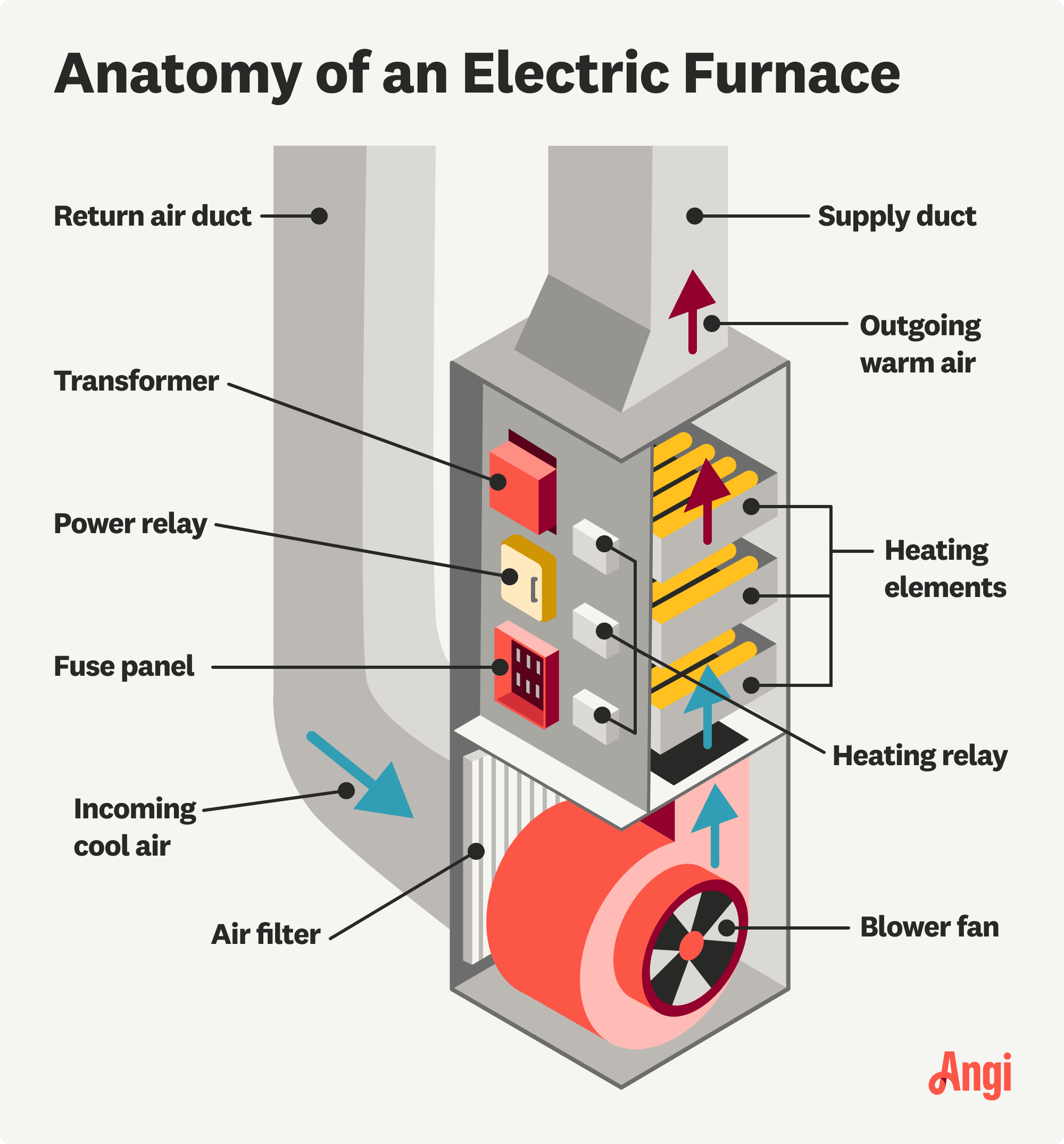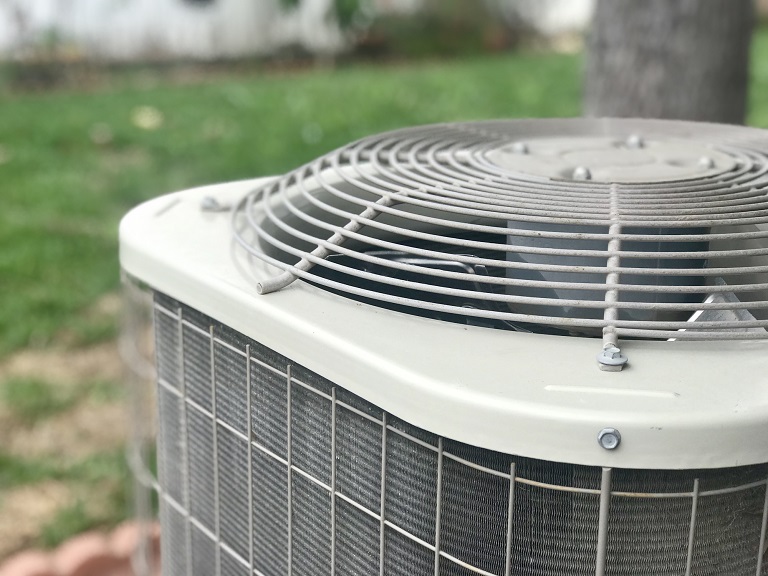
What you’ll pay for furnace repairs depends on many factors, including what parts are malfunctioning, where you live, and even the time of day. Here’s a breakdown of what can go wrong with your furnace and the cost to fix those issues.
Installing an electric furnace typically costs $5,078, with most people paying between $2,261 and $8,011, depending on labor, unit size, and more.


For homes between 1,500 and 2,000 square feet, an electric furnace costs between $1,100 and $2,800.
Running new ductwork averages $35 to $55 per linear foot, and cleaning existing ductwork costs $250 to $500.
Budget for additional costs, such as a building permit ($200 to $500) and disposal of the old furnace ($100 to $300).
Electric furnaces cost between $2,261 and $8,011 on average, with the most common price people pay for electric furnaces being somewhere around $5,078. This includes approximately $800 to $2,600 for the units themselves (although some larger units can cost as much as $4,500 in some cases) and $800 to $2,500 for the labor.
The square footage of your home plays a key role in determining the size of your electric furnace unit. The larger the house, the bigger the furnace you’ll need—and the higher the price tag. You’ll find that the size of an electric furnace is measured in British thermal units (BTUs), which tells you the amount of heat the unit can produce.
Refer to the following chart to help you estimate your electric furnace cost by size:
| Square Footage | BTUs | Average Cost |
|---|---|---|
| Less than 1,000 | 40,000 | $800–$2,600 |
| 1,000–1,500 | 40,000–55,000 | $900–$2,700 |
| 1,500–2,000 | 50,000–70,000 | $1,100–$2,800 |
| 2,000–2,500 | 70,000–90,000 | $1,200–$3,400 |
| 2,500–3,500 | 90,000–100,000 | $1,400–$4,500 |
The chart above is a good jumping-off point for determining what size electric furnace your house will need, but you should also take your climate into consideration.
Homeowners in the warmest climates in the U.S. can calculate a rough estimate of BTUs needed by multiplying the number of square feet in the home by 30 to 35 BTUs, while people in the coldest regions will need to multiply their home’s square footage by 50 to 60 BTU.
Installing a new electric heater is labor-intensive, so count on paying out for three to four hours of labor for a replacement unit and eight to 12 hours for a brand-new unit.
| Labor for an Electric Furnace | Average Costs |
|---|---|
| HVAC professional | $50–$150 per hour |
| Total labor cost to replace a unit | $300–$800 |
| Total labor cost to install a new unit | $800–$2,500 |

Here are a few additional factors to consider when trying to calculate the cost of your electric furnace installation.
| Added Cost | Average Cost |
|---|---|
| Electrical circuit and wiring | $500–$2,000 |
| Ductwork | $35–$55 per linear foot |
| New electric furnace installation | $4,700–$19,100 |
| Electric furnace replacement | $1,300–$8,400 |
| Permits | $200–$500 |
| Framing | $1,000–$3,000 |
| Disposal | $100–$300 |
| Thermostat replacement | $100–$250 |
| Electrical panel upgrades | $500–$1,800 |
| Maintenance | $150–$500 |
| Energy bill | $160–$315 per month |
If this is your first electric furnace, you’ll need to hire an electrician in addition to your local furnace installer to build a dedicated electrical circuit. A brand-new electrical circuit costs $500 to $2,000. If you are replacing an electric furnace, you don’t need to budget for this.
You may need to run some ductwork for heat distribution. Ductwork costs $35 to $55 per linear foot, with a total cost of $500 to $2,000 for an average single-family home. If your ductwork is up to date, you should have it thoroughly cleaned by a professional for $250 to $500.
A new furnace is around three times as costly as a replacement furnace. Someone replacing their existing electric furnace already has the ductwork and wiring. Plus, it takes two to three times longer to install a brand-new furnace. Since labor costs between $50 and $150 per hour, installation time heavily impacts the price.
| Electric Furnace Type | Average Cost |
|---|---|
| New installation | $1,300–$8,400 |
| Replacement | $4,700–$19,100 |
Obtaining a building permit costs $200 to $500 but will depend on where you live. Generally speaking, permits and licenses are cheaper in small towns compared to large metropolitan areas.
You may want to build a dedicated furnace room located in the basement, attic, or near a crawlspace. This is an entirely optional step, though it will increase the aesthetics of your home. A reputable contractor will frame out a furnace room for $1,000 to $3,000, making sure the furnace has proper ventilation and plenty of room to do its thing.
If you are replacing a pre-existing electric furnace, your pro will have to properly dispose of the old unit. This disposal costs $100 to $300, but be sure to talk to the installation expert to see if they’ll do it as part of your installation fee. You can also contact a local recycling center or scrap yard if you want to handle disposal by yourself.
The typical range for thermostat replacement costs is anywhere from $100 to $250. High-tech thermostats like smart thermostats usually come with a higher price tag. If you’re installing a new thermostat in a new location, keep in mind that there will likely be additional costs for wiring it. This can add up to $300 to the price.
If your home needs a new circuit breaker box, higher amperage, or a complete rewire, you’ll see a noticeable increase in the cost of your electric furnace. The cost to replace the average 150-amp circuit breaker box ranges anywhere from $500 to $1,800. Meanwhile, the basic cost of rewiring a house could run you up to $1,500.
You’ll need to service and clean your furnace at least every fall with a licensed furnace tuneup technician near you to keep your system running efficiently.
This inspection can cost anywhere from $150 to $500 on average. During the inspection, your technician will check the ductwork, air handler, heating elements, and the electrical system as a whole. The technician might adjust or tighten the system to protect your home from electrical shut-downs.
Get your HVAC system serviced and inspected at least once per year. For extra peace of mind, call in a pro twice annually: once before the hottest months of the year and again before the coldest time of year.
The average cost of residential electricity is 13 cents per kilowatt-hour. A furnace runs through a heating cycle once to three times per hour, depending on the weather, with each cycle clocking in at 10 to 15 minutes. That adds up to an average of two to four hours of active heating per day.
Considering the average home uses about 20,000 watts per hour of heating, the figures come out to $2.60 per hour, $5.20 to $10.40 per day, roughly $160 to $315 per month, and about $1,900 to $3,800 per year. These figures are subject to differ because electricity prices fluctuate according to the weather, and so do home sizes. Depending on the age of your furnace, you may want to upgrade to a more energy-efficient model to save on your energy bill.
| BTUs | kWh per Hour | Average Monthly Electric Bill |
|---|---|---|
| 50,000 | 14.7 | $250 |
| 75,000 | 22 | $390 |
| 90,000 | 26.4 | $460 |
| 100,000 | 29.3 | $500 |
If installing a new electric furnace, it’s best to leave the work to a pro to save yourself the risk and complexity of working with electrical circuits. Even replacement will require electrical upgrades that are best done by a trained professional. It costs between $50 and $150 per hour in labor fees to install electric furnaces in an average home, but you’ll find the price is well worth it in safety and efficiency.
Hiring an electric furnace installation pro can save you many troubles with the project, including:
Installing new electric furnaces requires permits and building inspections, which can be confusing for homeowners.
Electrical work comes with shock and burn risks. It’s safer to leave the work to a licensed and trained electrician.
New furnace installations are highly complicated. Hiring an insured pro protects your home, money, and energy.
Depending on your system, you may need to upgrade your wiring to sustain the higher electricity usage. This makes your furnace installation project even more complex.

Ask questions to understand the capacity, make, and model of the furnace your contractor recommends.
Determine the full scope of the project with your contractor. For example, if a panel upgrade is necessary to power your new furnace.
Ask about a detailed project time frame.
Check to see if your pro offers discounts for ongoing maintenance.
Home is the most important place on earth, which is why Angi has helped more than 150 million homeowners transform their houses into homes they adore. To help homeowners with their next project, Angi provides readers with the most accurate cost data and upholds strict editorial standards. We survey real Angi customers about their project costs to develop the pricing data you see, so you can make the best decisions for you and your home. We pair this data with research from reputable sources, including the U.S. Bureau of Labor Statistics, academic journals, market studies, and interviews with industry experts—all to ensure our prices reflect real-world projects.
Want to help us improve our cost data? Send us a recent project quote to [email protected]. Quotes and personal information will not be shared publicly.
From average costs to expert advice, get all the answers you need to get your job done.

What you’ll pay for furnace repairs depends on many factors, including what parts are malfunctioning, where you live, and even the time of day. Here’s a breakdown of what can go wrong with your furnace and the cost to fix those issues.

If you’re having problems with your air conditioner’s condenser, it may be time for an upgrade. Learn about the cost to replace an AC condenser in this guide.

Switching from oil to gas heating could impact your savings. This guide will help you understand the cost to convert from an oil furnace to a gas furnace.

Discover the average air handler replacement cost, including labor and materials, plus expert tips to help you budget and save on your HVAC upgrade.

Keep your home perfectly cool during the warm months. Learn about nine types of air conditioners and how to choose the right one for your home.

Do you have a clogged AC drain line? We dig into the reasons behind those pesky blockages and how to clear them for optimal AC performance.